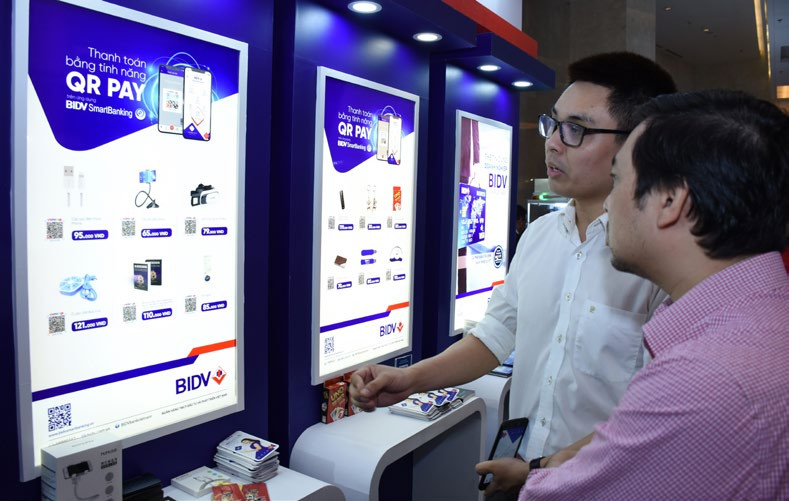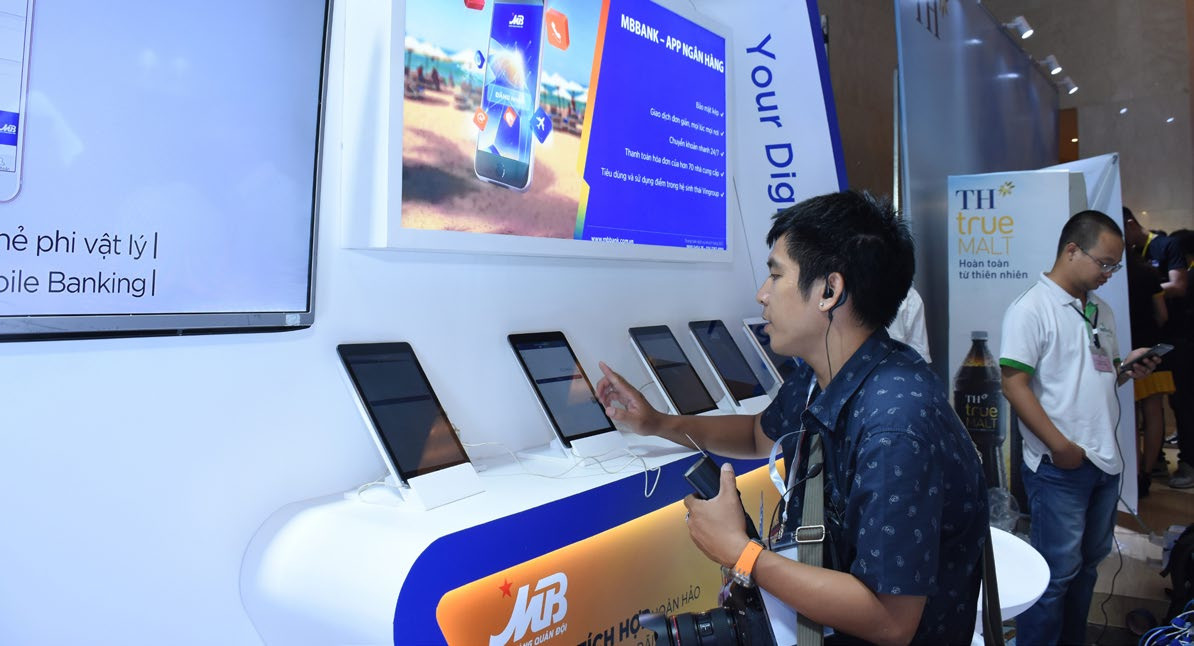Will banks transform into the ICT businesses of the future?
Tạp chí online - Ngày đăng : 23:04, 29/12/2020
VIETNAMESE BANKS AND THE RACE OF DIGITAL TRANSFORMATION
With a 200% growth rate in Mobile Banking, Vietnam currently has about 30 million people using banking payments services every day. Statistics show that there are 70 credit institutions in Vietnam providing payment services by mobile phone (m-banking). This figure excludes e-wallet units that act as intermediaries providing payment services via the Internet (e-banking). The value of financial transactions via Internet channels has reached over 7 million billion VND and 300,000 billion VND via mobile phones.

In order to keep up with the rapidly increasing trend to electronic transactions, and to improve the user experience, banks have been accelerating into the digital banking space. This race has been in full swing in 2020 when a series of small-to-large banks increased their investment in technology for digital transformation Recently, Vietcombank has made its first digital banking service, VCB Digibank, while BIDV launched a digital transformation campaign. Previously, VietinBank debuted the VietinBank iPay Mobile 5.1 application, VPBank with Yolo digital banking after the Timo model, Techcombank provided "Zero fee" on F@st Ebank, TPBank launched LiveBank, HDBank with HDBank mBanking service and ACB with ACB mBanking service ...
Chairman of MBBank's Board of Director Le Huu Duc said that MBBank has identified bank digitalization as the focus of its future development plan. To turn this goal into reality, MBBank has partnered with technology providers such as IBM, Oracle, and Viettel in order to optimize solutions for digital transformation. In 2020, MBBank has put its digital loyalty point system into operation, allowing users to purchase services and earn points. MBBank has also tested robotic payments, applied the digital signature and electronic authentication (eKYC) via its app.
Several small banks are also participating in the digitization race. For example, Nam A Bank has become the first commercial bank to apply robotics technology in transactions (Robot OPBA) to improve user experience and most recently to apply online customer information authentication (eKYC).; OCB has also digitized its account opening service so customers can open an online account within 3-5 minutes with OCB Omni digital bank. OCB has just upgraded OCB Omni digital bank to version 2.0 focusing on the personalization of user experience,…
VIETNAMESE BANKS ARE TRANSFORMING INTO DIGITAL TECHNOLOGY COMPANIES
At the meeting of Minister of Information and Communications Nguyen Manh Hung and Military Commercial Joint Stock Bank (MBBank) on 26 September 2020, General Director of MBBank Luu Trung Thai said that the bank would like to become a leading digital organization in the next 3 years. MBBank's goal is to serve 10 million customers and double its revenue so that 90% of transactions are on digital channels.
MIC Minister Nguyen Manh Hung suggested that MBBank should become a digital technology company and create platforms to provide services which focus on customers. Digital transformation is about transforming all their business activities. That's why many service companies are becoming technology companies.

In Vietnam, TPBank is gradually transitioning its image from a traditional bank to a technology company that applies automatic and robotic systems in banking activities supported by its own highly-skilled programming team. TPBank is determined that its customers will be served by state-of-the-art technologies as the bank's ambition is to become a leading digital bank in Vietnam. LiveBank is only part of the strong digitalization strategies that TPBank has implemented during the past 8 years. The key differentiator of becoming a leading digital bank is how TPBank masters the core technologies and positions itself internally for the future rather than being overly dependent on technology partners. At that time, all transactions could happen in a more convenient way and the security systems for customers could be applied at the highest level.
TPBank is also one of the few banks that is applying deep learning solutions quite early, as well as self-developed AI technology and Big Data to turn customers' smartphones into a mobile banking. Currently, TPBank is at the forefront of robot application that the company has planned to use nearly 100 robots in 2020 and replace hundreds of employees. In fact, TPBank has used robot banking in many activities such as inputting and analyzing data, not only saving time but minimizing human errors.
Currently, many banks confuse digital transformation and technology applications. Technology has been used for around 20 years and is completely different from digital transformation. For digital transformation, banks have to digitalize the services they offer and the first beneficiaries will be their loyal customers rather than new customers.
To look for new growth spaces, banks should develop beyond banking services, i.e. mobile banking that should be considered as a chance for people to get familiar with financial service. From that base they then can become banks' new customers.
"Why not turn Mobile Money into a banking service through the form of cooperation between banks and carriers? Working together, it is the mindset to develop digital transformation", MIC Minister Nguyen Manh Hung noted that digital transformation would make customers surprised by the service they are provided. That is the improved customer experience.
"Instead of creating a small unit to do digital transformation for a large corporation, let's digitalize the whole organization. Instead of waiting for customers, digital banks have to proactively approach customers and be able to predict loans which can be approved before they even have demand", said Deputy Minister Nguyen Huy Dung.
To do that, banks must reshape their relationships, consider digital technology businesses as partners not as competitors./.
